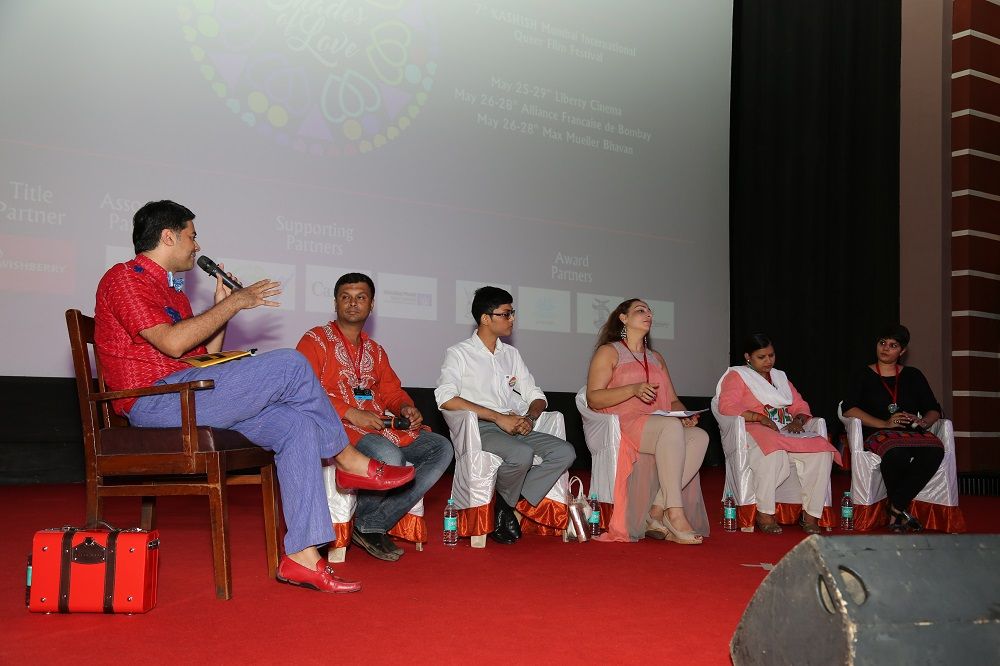‘CHANGE HAPPENS WHEN WE ASK FOR IT! – PANEL DISCUSSION ON SEC 377

Issues around section 377 of the Indian Penal Code, moved centrestage on the second day of KASHISH Mumbai International Queer Film Festival 2016. South Asia’s biggest LGBT film festival is being held from May 25-29, 2016 at three venues in South Mumbai – Liberty Cinema, Alliance Francaise de Bombay and Max Mueller Bhavan, and will screen 182 films from 53 countries.
This year the discussion moved to the main stage at Liberty Cinema. Festival Director Sridhar Rangayan in his opening remarks said that the aim was to ensure that “discussions no longer remain side-staged and the events at KASHISH 2016 included advocacy along with screening entertainment films.”
The panelists were activists Sonal Giani, Harish Iyer, Udayan Dhar of Godrej Industries, lawyer Vandana Shah and Chitra Batham from the Congress party. The discussion was moderated by Parmesh Shahani, vide President, Godrej Industries and Head of Godrej India Culture Lab.
The discussion officially kick-started with Parmesh throwing the most basic question at Sonal and Harish, “Where do you think we stand today with section 377?”. The answers that ensued paved way for further debate and deliberation. Sonal Giani, despite being unsure of the political scenario, was quite positive, “Let’s hope there is no homophobia (when the courts take up the curative petition against 377). There is not much hope from politicians, but we need social change”. Harish Iyer, on the other hand, had a completely different perspective to offer, “Unlike what we think, society is constantly changing and it is only through discussion that we can strive for this change. Where there is love there is hate. We have been pushed to a point where there is no choice but to be hopeful.”
The holistic composition of the panelists allowed the audience to learn about the LGBT situation on various socio-economic platforms. Udyan Dhar provided insight in the existing corporate situation of the country, “I’m proud to say that Godrej is one of the first Indian companies to incorporate the recognition of same-sex partners in its HR policies. The law only criminalizes a particular act, not the right to stand up against it or create a more egalitarian workplace. This awareness is lacking. We, at Godrej, were fortunate enough to have extremely supportive top management.”
Sonal, however, added an interesting perspective that the movement should not remain city-centric. “When we talk of the progress of the LGBT community, it is important to not speak only about situations that are centric to one city. I have been to various rural areas as a part of my work with the Humsafar Trust and I have seen the challenges faced by people out there.”
Chitra Bhatam represented the Congress party. When asked by Parmesh about what more the community can do to get its point across to politicians, she replied “I think conviction and belief. Show your strength. If you have to get your point across, that’s how it works.” Chitra. However, added that the Congress Party supports LGBT rights, not for vote-bank considerations, but because it is a matter of human rights.
The talk then delved deeper into the real issue of Section 377 and its incorporation in the IPC. Vandana read out the law and elaborated on its journey in Court so far. A divorce lawyer herself, she shared some experiences of hers that have raised the issue of how Section 377 affects everyone, “One of my clients came to me as he wanted to divorce his wife because he was gay. Moreover, he was afraid because his wife was blackmailing him,” said Chitra, adding, “I have more faith in the judiciary of our country than the politicians.”
After the floor was thrown open to the audience, Pallav Patankar of the Humsafar Trust asked the panelists, “How can we help Dr. Shashi Tharoor when he takes up the bill in the parliament to remove Section 377?”. Chitra’s response was, “We need to lobby. We need more numbers. We need to have meetings and also get them invited to festivals.”
“The challenges that we face in India are that companies do not even want to talk about these issues. If they just push like Godrej did, then everyone will follow suit,” said Sonal. “But change is a two-way street. Change happens when we ask for it.”, added Udyan.
